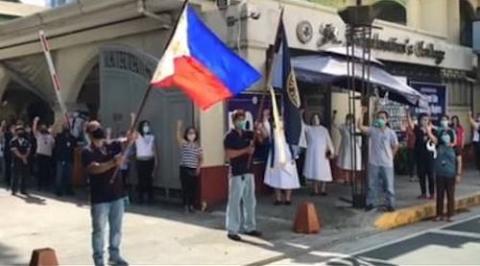
Sisters hold a banner of the Association of Major Religious Superiors of the Philippines at the July 27 rally at the University of the Philippines' University Avenue. Sr. Asuncion Borromeo is third from left. (Provided photo)
Nuns, priests and bishops in the Philippines issued protest calls in the run up to and during President Rodrigo Duterte's fifth State of the Nation address, delivered July 27 at the House of Representatives in Quezon City, Metro Manila.
Despite warnings about the threat of the COVID-19 pandemic, nuns wearing face masks and face shields joined morning protest activities on University Avenue at the main campus of the University of the Philippines in Quezon City. The stretch branches off from the 18-lane Commonwealth Avenue that leads to the House of Representatives building, which was off-limits to the public. The Philippine Daily Inquirer reported a crowd of about 2,000.
To make their presence known, nuns wearing face masks and face shields carried the streamer of the Association of Major Religious Superiors of the Philippines (AMRSP). Elsewhere in Metro Manila, other groups of nuns staged their own protests. The Missionary Benedictine Sisters who run St. Scholastica's College in the City of Manila went out to the streets to stage a short program.
Good Shepherd Sr. Juanita Daño and a group of lay people with "Defend Life & Human Rights" banners posed for a photo in front the Manila Cathedral and posted it on Facebook.
"It was a reunion of sorts," said retreat and spiritual directress Sr. Asuncion Borromeo, 76, of the Franciscan Missionaries of Mary, who was at the rally. "Many times I shed tears because I could see the fighting spirit of the young and the old, all colors, all creeds, all cultures, defending our democracy. As long as I still have my God-given strength, I will continue to march for the love of our country and people. Democracy has to be defended at all cost."
Advertisement
And while the State of the Nation Address was going on in the afternoon, Jesuit Communications' Radyo Katipunan aired an online alternative Tinig ng Bayan (Voice of the People) SONAgkaisa ("so being one") concert, which featured singers, poets and musicians. Katipunan is the name of the Quezon City avenue along which the Jesuits' 100-hectare Ateneo de Manila University campus is located. Katipunan is also the name of the revolutionary group that led the revolt against the Spanish colonizers in the late 1800s.
In the weeks and days leading up to the president's address, church groups had sent out protest statements on issues such the government's handling of the COVID-19 pandemic, the new Anti-Terrorism Law that superseded the Human Security Act, freedom of expression related to the closure of the Philippines' biggest broadcast network ABS-CBN, the cases filed against online news network Rappler — plus other issues, such as the plight of stranded overseas Filipino workers and locally stranded individuals, China's occupation of Philippine territories on the West Philippine Sea and the four-year drug war that has claimed thousands of lives.
The Association of Major Religious Superiors of the Philippines said in a statement: "Indeed, it is time again to make a stand, speak up and be counted." The AMRSP and its task forces were in the forefront against the Marcos dictatorship from 1972 to 1986.
Here are some select items from their statement:
There is so much hatred and division in our midst … Today, we, too, see and feel the suffering of our people, and we find ourselves compelled to ask, Nasaan ang tapang at malasakit? (Where is the courage and compassion?)…
Is it tapang [courageous] to kill unarmed, helpless, poor people in the name of a "war on drugs?" Is it not fundamentally wrong from any point of view, moral or legal, to take a life without regard for due process and rule of law? Reports say (deaths have) reached 27,000. … We cannot begin to fathom the immense pain and anguish, for they are no more.
Is it tapang to bombard us repeatedly and incessantly with chauvinistic, misogynistic words, as if women were mere chattel? ... Is it tapang to launch a never-ending assault on perceived personal enemies with such viciousness, especially towards women — Senator Leila de Lima, Chief Justice Maria Lourdes Sereno, Senator Risa Hontiveros, Sr. Mary John Mananzan OSB and Vice-President Leni Robredo, to name a few?
Is it tapang and malasakit [compassionate] to foist an Anti-Terror Law upon our people that only instills terror and fear? Is it not wickedness to prioritize a law that curtails basic rights and freedoms? Should we not put all our efforts at containing the pandemic which continues to spread uncontrolled?
Is it tapang and malasakit to close a media outfit and muzzle journalists? Is it not the work of the wicked to silence the press?
The statement was signed by AMRSP chairpersons Franciscan Fr. Cielito Almazan and Religious of the Cenacle's Sr. Marilyn Java.

Missionary Benedictine Sisters hold a program in front of St. Scholastica's College in Manila, Philippines. (Provided photo)
The Missionary Benedictine Sisters and the Religious of the Good Shepherd also issued separate statements critical of the Duterte administration on extrajudicial killings, suppressing media and its handling of the COVID-19 crisis. As of July 28, the Philippines had 83,673 COVID-19 cases and had recorded 1,947 deaths.
The Religious of the Good Shepherd sisters sent a letter of Appeal to the Supreme Court to issue a restraining order against the Anti-Terrorism Law (dubbed by critics as the "Terror Law") that Duterte signed and became effective on July 18.
The letter said:
We unite our voices with all those raising alarm and concern over the provisions of this Act that are vague in definitions and ripe for misinterpretation and abuse of power. We have witnessed the repression of rights as inflicted against lawyers, activists, dissenters, journalists, including radio and TV stations, faith-based organizations, innocent victims and others. We fear this will curtail our right to free speech, protest and dissent. …
We believe that provisions that allow warrantless arrests and unlawful detention are dangerous and unconstitutional.
The law makes the organizations that work for the underprivileged and advocate against injustice vulnerable to being associated with and designated as terrorists. Consequently, our humanitarian and developmental work to uplift the poor and the marginalized may be met with antagonism, division, arbitrary arrests and long imprisonment.
At least 16 petitions have been filed before to the Supreme Court. More are expected in the coming days.

Screenshot of televised address by Philippines' President Rodrigo Duterte delivering his fifth State of the Nation address July 27. (Ceres Doyo
The Catholic Bishops Conference of the Philippines aired on Facebook a music video "Panawagan" that calls for renewal in the midst of the present national crisis. A people's Kyrie, it features Archbishop Socrates Villegas and Bishop Broderick Pabillo speaking and the music of Papal Awardee and National Artist Ryan Cayabyab.
This month, the House of Representatives denied the renewal of ABS-CBN's franchise, which means 11,000 wage earners are losing their jobs, among them artists, celebrities and broadcast journalists. Duterte had vowed retaliation against the network for the non-airing of his campaign ads during the 2016 election campaign. The network had denied other accusations during the House hearings. Duterte wants ABS-CBN to sell out.
Duterte had also expressed ire against online news network Rappler. Its executive editor and CEO Maria Ressa is now facing more than 15 cases. In June, a judge declared her guilty of cyberlibel.
Duterte's 105-minute State of the Nation address showed him having difficulty reading from a teleprompter (he said so), switching every now and then to extemporaneous talking. Applause was few and far between. He enumerated his government's accomplishments but called himself "inutile" in the face of China's grabbing of Philippine territories in the West Philippine Sea. He warned telecom giants Globe and Smart to give better service. He also asked for the revival of the death penalty.
Present at the address were congressmen and senators who attended virtually via Zoom or physically but wearing masks and observing physical distancing. The high-ceilinged hall that can fit more than 300 congressmen plus a thousand more in the gallery had only about 50 physically present lawmakers.
[Ma. Ceres P. Doyo has been a journalist for more than 30 years. She writes features, special reports and a regular column, "Human Face," for the Philippine Daily Inquirer. She covers a variety of subjects, church matters among them.]




